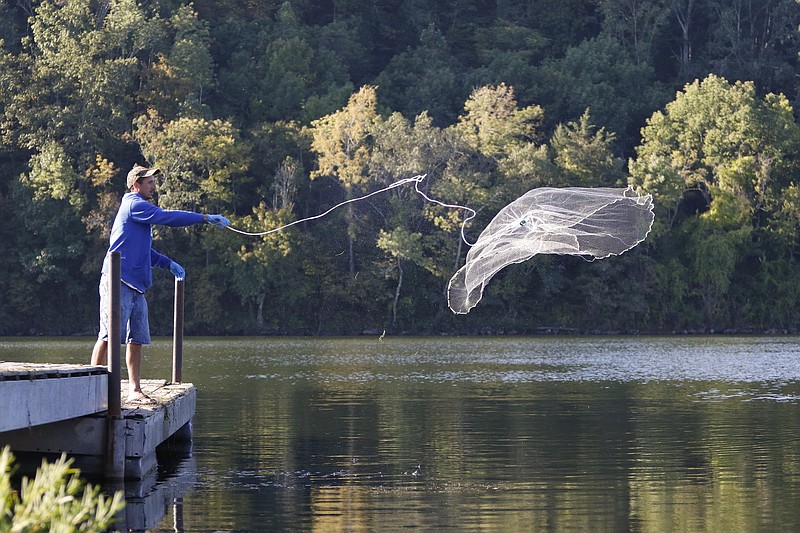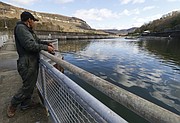With hundreds of lakes and streams as well as several national forests and wildlife refuges, there are lots of options for anyone interested in trying their skills on the water or in the woods.
The Tennessee Wildlife Resources Agency works year-round to keep the area's wildlife and fisheries healthy and available for hunters and anglers. The TWRA's work on Lake Chickamauga has made it one of the more popular areas for bass fishing in the nation; in 2013 the reservoir was named the sixth best area for largemouth bass fishing in the nation by Bassmaster Magazine.
Nickajack Lake downstream from Chattanooga and Lake Guntersville in northeastern Alabama are other Tennessee Valley Authority reservoirs in the area that are used frequently for tournaments as well as by recreational anglers.
For hunters, the TWRA and corresponding agencies in Georgia and Alabama maintain several wildlife management areas, and scheduled hunts are held for deer and other game in the late summer and fall.
The TWRA has a smartphone app that allows sportsmen to purchase licenses, share photos of any trophy fish or game taken and pass along information needed to hunt and fish safely in Tennessee.
A license is required for someone to hunt or fish legally in Tennessee, Georgia and Alabama, and there are specific seasons and rules regulating those activities. Hunters and fishermen should always check with a state's wildlife resources agency before heading to the great outdoors.
Tennessee licenses are available at TWRA regional offices, license agents throughout the state, online at www.tnwildlife.org, through the TWRA On the Go App or by phone at 1-888-814-8972. Extra fees apply for phone and Internet orders. A Social Security number is required in all cases.
Tennessee licenses
Hunting and fishing licenses go on sale each year on Feb. 18. Resident hunting and fishing licenses can be purchased by:
People who possess valid Tennessee driver's licenses.
People who have lived in Tennessee for 90 consecutive days with the genuine intent of making Tennessee their permanent home. Proof of residency required.
Military personnel on active duty in this state and their immediate families who reside with them.
Students enrolled in Tennessee schools, colleges or universities for at least six months.
Tennessee license types
Hunting and Fishing Combination ($34): Minimum license required to fish or hunt small game.
Annual Sportsman ($166): All-inclusive license for hunting, trapping and sport fishing without state supplemental licenses or non-quota permits; holders may apply for quota permits at no extra cost.
Junior Hunt/Fish/Trap ($10): For ages 13 to 15. Good for hunting all game, fishing and trapping. Must be purchased before 16th birthday. No supplemental licenses required, but special season and WMA permits need to be purchased. Fees apply when applying for quota hunt permits, as well as leftover permits.
Annual Senior Citizen Hunt/Fish/Trap ($5): Can only be purchased when 65th birthday is reached. No supplemental licenses are required, but special season and WMA permits need to be purchased as well.
Note: Check the Tennessee Wildlife Resources Agency website at tn.gov/twra for information about supplemental licenses for large game and special licenses for disabled hunters, trapping and lifetime permits, plus many others.
Georgia licenses
Georgia licenses are available throughout the state from about 400 license agents in many sporting-goods stores, marinas, bait and tackle stores, hardware stores, etc. Licenses also may be purchased at Department of Natural Resources enforcement offices statewide. For more information, go to georgiawildlife.org.
Prices include $10 for general hunting ($18 for two years) and $9 ($16) for a fishing license for Georgia residents, $17 ($31) for a combo license and $55 ($105) for a sportsman's license. A big-game license costs $9 ($16), but $195 for nonresidents, and a trout license for one year is $5, $10 for two years for Georgia residents.
Area hunting and fishing organizations
Chattanooga Bass Association: A nonprofit community organization that has been in operation since 1976. The CBA operates a local fishing tournament circuit with tournaments from late winter into the fall, culminating with the two-day CBA Classic in mid-October. Some of the events are at night. For more information, go to the CBA website at cbatournament.com.
Chattanooga Ducks Unlimited: This organization provides education for local duck hunters and promotes habitat conservation through fundraisers and other activities. Learn more at ducksunlimited.com.
Tennessee Wildlife Resources Agency: This state agency is in charge of managing Tennessee's fishing and wildlife resources and licensing for hunting and fishing throughout the state. Learn more at tn.gov/twra.
Trout Unlimited: Appalachian Chapter: This group promotes trout fishing and river conservation throughout the area and encourages new trout fishermen and women through education programs. Learn more at appalachiantu.org.
Tennessee Bass Federation: This grassroots organization promotes catch-and-release bass fishing in the state, and it works to promote fishing and introduce young people and new fishermen to the sport through local tournaments. Learn more at tnbass.com.
Nearby Tennessee hunting
ELK RIVER: A great river for trout fishing less than a two-hour drive from Chattanooga.
Directions: Take I-24 west to Monteagle. Take the Sewanee exit left on Highway 15 heading west. Connect to Highway 50 West in Winchester. About a 15-minute drive will take you to the public put-in below Tims Ford Dam.
LITTLE SEQUATCHIE RIVER: This river is stocked by the state with rainbow trout each year.
Directions: I-24 west to the Highway 28 exit to Dunlap.
CHICKAMAUGA LAKE: Fish are abundant in the lake; primary species of sport fish include white crappie, bluegill, white bass, channel and blue catfish, largemouth bass and sauger.
Directions: Take exit 4 from I-75 and go north on Highway 153 (Chickamauga Dam/Airport exit) to the Chickamauga Dam Exit.
HIWASSEE RIVER: It is considered by area fishermen as the best dry-fly river in the Southeast.
Directions: From Chattanooga, take I-75 north to Cleveland, exit at U.S. Highway 64E (Exit 20). Travel east on U.S. 64 to Highway 411N. Park is 6 miles north of Benton.
NICKAJACK RESERVOIR: This is an excellent fishery for smallmouth bass, largemouth bass, striped bass, white bass, panfish and catfish.
Directions: Take I-24 west to Exit 161; look for signs.
NORTH CHICKAMAUGA CREEK: Hamilton County's streams are stocked with rainbow trout in early spring. Although fishing can be good in the cooler season, most stocked trout are fished out by summer, with the exception of a few hold-over fish.
Directions: North Chickamauga Creek Gorge is 15 miles north of Chattanooga. Via Highway 27, take the Thrasher Pike exit and turn left. Proceed about 1 mile to Dayton Pike and take a right. Proceed another mile to Montlake Road and take a left. Proceed 1.5 miles to the entrance, which will be on the left.

